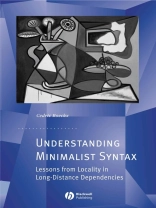Understanding Minimalist Syntax introduces the logic of the Minimalist Program by analyzing well-known descriptive generalizations about long-distance dependencies.
* An introduction to the logic of the minimalist program – arguably the most important branch of syntax
* Proposes a new theory of how long-distance dependencies are formed, with implications for theories of locality, and the minimalist program as a whole
* Introduces the logic of the minimalist program by analyzing well-known descriptive generalizations about long-distance dependencies, and asks why they should be true of natural languages
* Rich in empirical coverage, which will be welcomed by experts in the field, yet accessible enough for students looking for an introduction to the minimalist program.
Inhaltsverzeichnis
Acknowledgments xi
1 Introductory Remarks 1
1.1 The Framework 1
1.2 Outline of the Book: Goals and Structure 4
2 The Marks of Successive Cyclicity (The What-Question) 9
2.1 Subjacency and the Emergence of Successive Cyclicity 9
2.2 The Evidence 11
2.2.1 Syntax 11
2.2.2 Morphology 14
2.2.3 Phonology 22
2.2.4 Semantics 23
2.2.5 Morpho-syntactic evidence from overtly stranded pieces 26
2.3 A-movement 29
2.4 Conclusion 34
3 The Distribution of Intermediate Landing Sites (The Where-Question) 39
3.1 Punctuated vs. Uniform Paths 40
3.2 The Difficulties Faced by Punctuated Path Hypotheses 43
3.2.1 Phases: an overview 44
3.2.2 Conceptual arguments for phases 46
3.2.3 Arguments against phases 48
3.2.4 Old problems for phases 50
3.2.5 No empirical argument for phases 54
3.3 Conclusion 61
4 The Timing of Intermediate Steps of Movement (The When-Question) 64
4.1 Early vs. Late Successive Cyclicity 64
4.2 Takahashi (1994) 66
4.3 The Evidence for Early Successive Cyclic Movement 70
4.3.1 Background information on applicatives 71
4.3.2 The need for early successive cyclic movement 76
4.4 Potential Arguments for Late Successive Cyclic Movement 80
4.4.1 Sub-extraction out of a moved element 80
4.4.2 Intervening traces 82
4.4.3 Object agreement 83
4.5 Conclusion 86
5 The Motivation for Intermediate Movement Steps (The Why-Question) 90
5.1 Last Resort 90
5.2 Problematic Cases 91
5.2.1 Concord 91
5.2.2 Successive cyclicity 92
5.3 Anti-locality 101
5.4 Anti-locality and Successive Cyclicity 106
5.5 Anti-locality and Last Resort 110
5.6 The Why-Question 113
5.7 Conclusion 117
6 Alternative Views on Successive Cyclicity 119
6.1 TAG-based Accounts 119
6.2 An Agreement-based Account 125
6.3 Prolific Domains 129
6.4 Greed-based Approaches 129
6.5 Conclusion 132
7 Successive Cyclicity and Other Aspects of Locality 133
7.1 The Standard View on Islands 134
7.2 Puzzles for the Standard View 136
7.2.1 Movement, freezing, and escape hatch 136
7.2.2 Island by default? 137
7.2.3 Island-obviation 137
7.3 Ross’s View 145
7.4 Agreement and Islandhood 145
7.5 Conclusion 148
8 Concluding Remarks 150
References 152
Index 167
Über den Autor
Cedric Boeckx is Assistant Professor of Linguistics and a member of the Mind/Brain/Behavior Interfaculty Initiative at Harvard University. He is the author of Islands and Chains (2003), Linguistic Minimalism (2006), and numerous articles in journals such as Linguistic Inquiry and Natural Language and Linguistic Theory.












